- Home
- Fergus Hume
A Coin of Edward VII: A Detective Story Page 9
A Coin of Edward VII: A Detective Story Read online
Page 9
CHAPTER VIII
THE IRONY OF FATE
Giles was slowly recovering from his illness, but as yet was unable toleave his room. It was now over a month since the death of Daisy, andduring that time all matters connected therewith had been reported tothe invalid. Thus he knew of the funeral, of the verdict of the jury,and of the search that was being made for Anne. Trim, who nursed hisyoung master--and he would not allow any one else to do so--day by day,related all that was taking place. The man himself quite believed thatMiss Denham was guilty, but he did not offer this opinion to Ware,knowing how keenly Giles felt the untoward tragedy.
The young squire could not bring himself to believe that Anne wasguilty. Appearances were against her, and he could not conceive whatexcuse she could make for her flight with the lawyer's clerk. If shewere innocent, she had gone the best way to work up a feasible caseagainst her. But Giles was so deeply in love with her that the blackerbecame her character in the mouths of the general public, the morepersistently he held to the belief that it was whiter than snow. Had hebeen able he would have followed her, in order to persuade her toreturn and face the worst with a frank story of the events of thatterrible night. But he was chained to his bed, and even had he beensufficiently well, he could not have traced her whereabouts. Steel hadcalled to explain his doings, but not even he could guess where Anne wasto be found. And Giles rejoiced that this should be so.
"What's the news this morning, Trim?" he asked languidly.
"Mr. Morley has come to see you, sir. He is waiting below."
"I thought he had gone to Brighton with his wife and family?"
"He did go some days back," assented Trim, "but he returned, sir--so hesays--especially to see you."
"How very good of him! Ask him to come up."
"Are you strong enough, Master Giles?"
"Yes, you old tyrant. I hope to be up and about in a week."
Trim shook his grey head. He was rather a pessimist, and did not believein too sudden recoveries, insisting that such did not last.
"You'll have a relapse, sir, and be worse than ever."
Ware laughed, knowing Trim's ways, and motioned him out of the room.When the old servant left, grumbling that his master should bedisturbed, Giles began to wonder what had brought Morley back fromBrighton. Perhaps he had come to speak of Daisy and her untimely end;but he had already, on a previous occasion, said all that was to be saidabout that matter. Ware sincerely mourned Daisy, for in a way he hadbeen fond of her. Still, he could not but confess that a marriagebetween them would have been a mistake, and that drastic as was thecutting of the Gordian knot, it relieved him from an impossibleposition. His love for Anne would always have stood between himself andthe unfortunate girl, and her jealousy would have ruined both theirlives. Certainly he saw no chance of making Anne his wife, seeing thatshe was a fugitive and accused of a terrible crime. Nevertheless, sincehe had not to marry Daisy, the situation was less difficult. But Ware,his heart aching for the woman he loved, found cold comfort in thisreasoning.
Morley entered, looking ruddy and cheerful, quite his old self, in fact.Evidently the sea air and the change had assuaged his grief to aconsiderable extent, and Giles could not help remarking cynically on hisquick recovery. "I thought you were fond of Daisy," he saidreproachfully.
"I was, and so was my wife," answered Morley, taking a seat beside thebed. "But what's done can't be undone, and I have been trying to getover my sorrow. But in spite of my looks, Ware, I have my bad moments.And you?"
"I sincerely mourn for the poor girl. It is terrible that she should becut off so suddenly. But I am just as sorry for Miss Denham, if not moresorry. It is those who are left behind that suffer most, Morley."
"Humph!" said the little man thoughtfully, "then you _did_ love MissDenham?"
"Morley"--Giles started up on his elbow--"what do you mean?"
"I am simply repeating what Daisy said."
"She had a monomania on the subject," said Ware uneasily. "I never gaveher any cause for jealousy."
"Would you have married her had she lived?"
"Certainly," said Ware coldly. "I promised my father that the daughterof his old friend should be my wife."
"I am sure you would have acted honorably," said Morley gravely, "but itis just as well that you did not marry the girl. I think she had somereason to be jealous of Miss Denham."
Ware groaned. "I tried my best to----" He broke off with a frown. "Thisis my private business, Morley. You have no right to pry into thesethings."
Morley shrugged his shoulders. "As you please. I shall say no more. ButI don't expect you'll see Miss Denham again."
"I don't expect I shall. Please leave her name out of thisconversation."
"For the moment I am agreeable to do so. But as I believe her to beguilty, I must ask you a question or two."
"I shall answer no questions," responded Giles violently. "Miss Denhamis innocent."
"Then why did she fly?"
"I don't know. If I can only find her, I shall ask her to come back andface the worst. She can explain."
"She will have to when she is caught. How do you propose to find her,Ware?"
"I don't know. Wait till I am on my feet again."
"Well," said Morley cheerfully, "I'll give you a clue--the ScarletCross."
"Rubbish! There's nothing in that in spite of the anonymous letter. Whatdo you know about the matter?"
"Only what Steel told me. He found a boatman at Gravesend who declaredthat on the day of the crime--Steel gave him the date--a small steamyacht was lying in the river off the town. It was called _The RedCross_. The next morning it was gone. The night was foggy, and no onesaw it leave its moorings. It simply vanished. What do you make of that,Ware?"
"Nothing at all. What has this yacht to do with Miss Denham?"
"Can't you see? The anonymous letter referred to a Scarlet Cross. Suchan ornament was picked up in the church, and the boat was called----"
"_The Red Cross_--not _The Scarlet Cross_," interrupted Ware.
"Only a difference of shade," said Morley ironically. "But I am certainthat Miss Denham with her companion went on board that yacht. I can'tthink how else they escaped."
"Why should this lawyer's clerk have gone on board?"
"That's what Steel is trying to find out. I expect he will makeinquiries of Asher, Son, and Asher's office. But the name of the yacht,the fact that Miss Denham made for Gravesend, where it was lying, andits appearance and disappearance within twenty-four hours during whichthe crime was committed shows me that she fled and that she is guilty."
Ware restrained himself with a violent effort. "Oh," he said ironically,"then you believe that Miss Denham arranged that the yacht should be atGravesend, ready for her flight, after the death of Daisy."
"It looks like that," assented Morley. "I believe myself that the crimewas premeditated."
"And was the fact of my car being at the church gate premeditated?"asked Ware angrily.
"Why not? Miss Denham knew that your car was coming for you after theservice."
"Morley, I admit that things look black, but she is not guilty."
"Humph! You love her."
"That has nothing to do with it."
"As you will. Let us say no more on the subject. I wish to tell you whyI came."
"It is sure to be a more disagreeable subject," retorted Giles; thenfelt compunction for the rude speech. "I beg your pardon, Morley, I am aperfect bear. But this illness has made me peevish, and the events ofthe last few weeks have rendered my brain irritable. Forgive my badtemper."
"Oh, that's all right, Ware," replied his visitor heartily. "I canalways make allowances for invalids. You'll be your old self againshortly."
"I shall never be myself again," replied Giles gloomily.
It was on the tip of Morley's tongue to make some fresh reference toAnne. But he knew that such a remark would only exasperate the invalid;and, moreover, Giles looked so ill and worried that Morley generouslyrefrained fro
m adding to his troubles. "Let us come to business," hesaid, taking some papers out of his breast coat-pocket. "Since you wereengaged to Daisy I thought it right that you should be made aware of acommunication I have received from Asher, Son, and Asher."
"About the summons you told me of?" asked Ware wearily. He did not takemuch interest in Morley's affairs.
"No. I have managed to compromise that. The solicitors have acceptedpayment in instalments. In this instance they write to me officially asDaisy's guardian. She has come into five thousand a year, Ware."
Giles opened his eyes and sat up in bed excitedly.
"Do you mean to say that her half-uncle Powell is dead?"
Morley nodded. "Very ironical, isn't it?" he said. "She was alwaystalking and hoping for the money, and now when it comes she is unable toenjoy it. What tricks Fate plays us to be sure!"
"Poor girl!" sighed Giles; "how often have we discussed the prospect ofher being an heiress! I always told her that I had enough for both, butshe hankered after having money in her own right."
"Look at the papers," said Morley, handing them to the young man, "andyou will see that Powell died over four months ago in Sydney. Hissolicitors arranged about the estate in the colony of New South Wales,and then communicated with Asher as Powell had advised them before hedied. There is a copy of the will there."
"So I see. But tell me the chief points in it. I feel too tired to wadethrough all this legal matter."
"Well, the money was left to Daisy, and failing her it goes to a mancalled George Franklin."
"H'm! He has come in for his kingdom very speedily, thanks to the deathof poor Daisy. Who is he?"
Morley glanced at a letter. "He was the brother-in-law of Mr.Powell--married Powell's sister who is dead. I don't know if there isany family. Asher's firm doesn't know the whereabouts of Franklin, butthey are advertising for him. The five thousand a year goes to himwithout reservation."
"Why did they tell you all this?"
"I really can't say, unless it is because I was Daisy's legal guardian.I wish she had come in for this money, Ware, for I do not say but what Ishouldn't have been glad of a trifle. And if Daisy had lived she wouldhave paid me something. Certainly as I did what I did do out of sheerfriendship with her father, I have no right to demand anything, but whenFranklin hears of my circumstances I hope he will lend me some money toget me out of my difficulties."
"It all depends upon the kind of man he turns out to be. But I alwaysthought, Morley, that it was your wife to whom Kent left his daughter.She was an old friend of his."
"Quite so; but Kent appointed me guardian, as Mrs. Morley refused to belegally bound. I am sure I did my duty," added the little man, withsudden heat.
"I am sure you did. You behaved like a father to her, and I am sorry shedid not live to repay you." Giles thought for a moment or so, thenadded, "I was engaged to Daisy, and I am rich. Let me help you, Morley."
"No, thanks. It is good of you to suggest such a thing, but I am a veryindependent man. If this Franklin will do anything, I don't mindaccepting a thousand from him; otherwise--no, Ware."
Giles admired the bluff way in which Morley said this. He knew well thatfor a long time Morley and his wife had done all they could for DaisyKent, and that both of them deserved great praise. He suggested thatMrs. Morley might be induced----
"No," interrupted his visitor, "my wife wants nothing. She has her ownmoney, and ample means."
"Then why don't you ask for her help?"
"My dear Ware, I married Mrs. Morley because I loved her, and not forher money. All her property is settled on herself, and I have nottouched one shilling of it. She would willingly help me, but I haverefused."
"Isn't that rather quixotic on your part?"
"Perhaps," responded Morley, with some dryness; "but it is my nature.However, I see that I am tiring you. I only came to tell you of thisirony of fate, whereby Daisy inherited a fortune too late to benefit byit. I must go now. My wife expects me back in Brighton to-morrow."
"When do you return to The Elms?"
"In a month. And what are your movements?"
Ware thought for a few minutes before he answered. At length he spokeseriously.
"Morley, I know you are prejudiced against Miss Denham."
"I think she is guilty, if that is what you mean, Ware."
"And I say that she is innocent. I intend to devote myself to findingher and to clearing up this mystery."
"Well, I wish you good luck," said Morley, moving towards the door; "butdon't tell me when you find Miss Denham. If I come across her I'll haveher arrested."
"That's plain enough. Well, since you are her declared enemy, I shallkeep my own counsel." He raised himself on his elbow. "But I tell you,Morley, that I shall find her. I shall prove her innocence, and I shallmake her my wife."
Morley opened the door.
"The age of miracles is past," he said. "When you are more yourself, youwill be wiser. Good-bye, and a speedy recovery."
As the visitor departed Trim entered with the letters. He was not at allpleased to find Giles so flushed, and refused to hand over thecorrespondence. Only when Ware began to grow seriously angry did Trimgive way. He went grumbling out of the room as Giles opened his letters.The first two were from friends in town asking after his health; thethird had a French stamp and the Paris postmark. Ware opened itlistlessly. He then uttered an exclamation. On a sheet of thin foreignpaper was the drawing in pencil of a half-sovereign of Edward VII., andthereon three circles placed in a triangle, marked respectively "A,""D," and "P." Below, in a handwriting he knew only too well, was writtenthe one word "Innocent."
"Anne, Anne!" cried Ware, passionately kissing the letter, "as though Ineeded you to tell me that!"
And it was not till an hour later that he suddenly remembered what anarrow escape he had had from putting Morley on the track of AnneDenham. Had Morley seen that letter----?
"Paris," murmured Giles, "I'll go there."

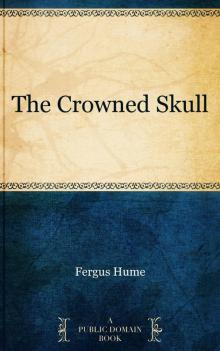 The Crowned Skull
The Crowned Skull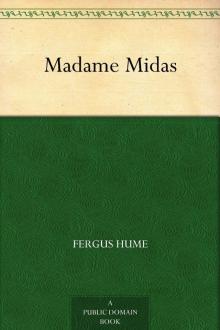 Madame Midas
Madame Midas The Opal Serpent
The Opal Serpent The Solitary Farm
The Solitary Farm The Mystery Queen
The Mystery Queen The Bishop's Secret
The Bishop's Secret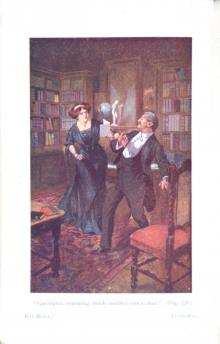 Red Money
Red Money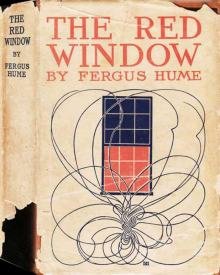 The Red Window
The Red Window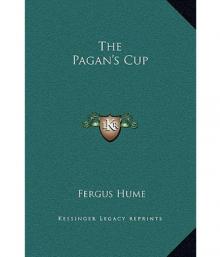 The Pagan's Cup
The Pagan's Cup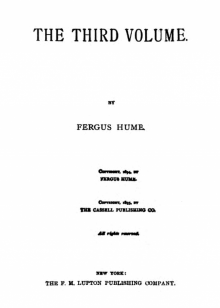 The Third Volume
The Third Volume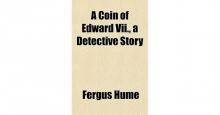 A Coin of Edward VII: A Detective Story
A Coin of Edward VII: A Detective Story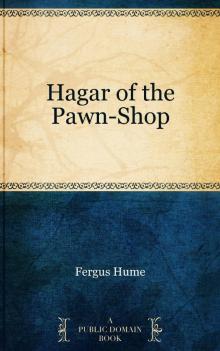 Hagar of the Pawn-Shop
Hagar of the Pawn-Shop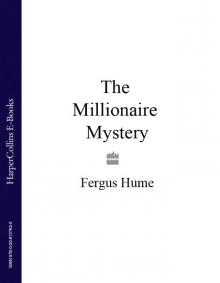 The Millionaire Mystery
The Millionaire Mystery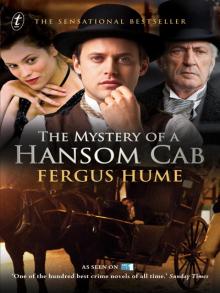 The Mystery of a Hansom Cab
The Mystery of a Hansom Cab